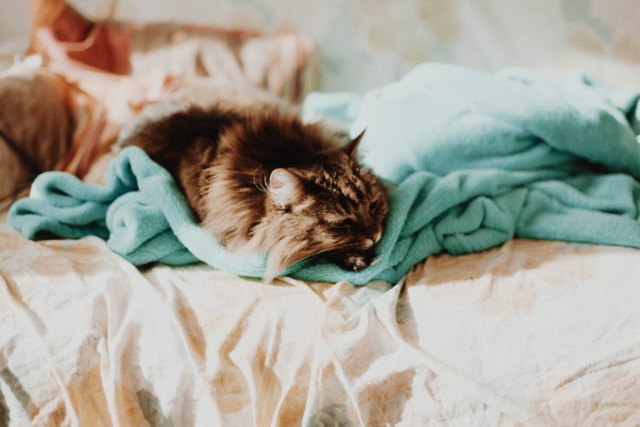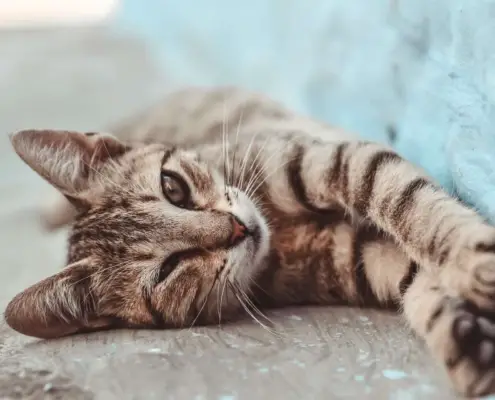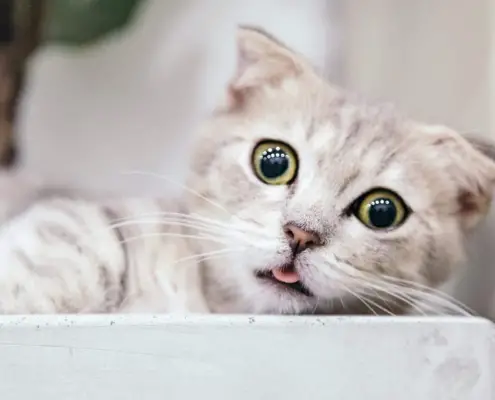
Cats, just like humans, are prone to various illnesses. Understanding the common cat illnesses can help pet owners take preventive measures and seek timely treatment. Here are some of the most prevalent cat illnesses:
- Upper Respiratory Infections: Cats can suffer from respiratory infections caused by viruses or bacteria. Symptoms include sneezing, coughing, nasal discharge, and fever.
- Urinary Tract Infections: Cats, especially males, can develop urinary tract infections. Signs of a urinary tract infection include frequent urination, blood in the urine, and difficulty in urinating.
- Dental Disease: Dental issues, such as gum disease and tooth decay, are common in cats. Bad breath, swollen gums, and difficulty eating can indicate dental problems.
- Parasites: External parasites like fleas and ticks can cause discomfort and transmit diseases to cats. Internal parasites, such as worms, can lead to digestive issues and weight loss.
- Diabetes: Cats can develop diabetes, which affects their ability to regulate blood sugar levels. Increased thirst, frequent urination, weight loss, and lethargy are signs of diabetes in cats.
Signs and Symptoms of Cat Illnesses
Being aware of the signs and symptoms of cat illnesses is crucial for early detection and prompt veterinary care. Here are some common indications that your cat may be unwell:
- Changes in Behavior: A normally active and playful cat becoming lethargic, withdrawn, or aggressive may indicate an underlying health issue.
- Loss of Appetite: If your cat suddenly loses interest in food or experiences a significant decrease in appetite, it could be a sign of illness.
- Weight Fluctuations: Unexplained weight loss or weight gain can be a symptom of various cat illnesses, including thyroid problems or metabolic disorders.
- Vomiting and Diarrhea: Frequent vomiting or diarrhea can be a sign of gastrointestinal problems, infections, or food allergies.
- Altered Elimination Habits: Changes in urination or defecation patterns, such as increased frequency, difficulty, or blood in the urine or stool, may indicate an underlying issue.
- Respiratory Distress: Labored breathing, coughing, wheezing, or sneezing are signs of respiratory infections or other respiratory problems in cats.
Preventive Measures for Cat Illnesses
Prevention is key when it comes to ensuring the well-being of your cat. By following these preventive measures, you can minimize the risk of cat illnesses:
- Regular Vaccinations: Keep your cat’s vaccinations up to date to protect them against common feline diseases, such as feline leukemia, rabies, and distemper.
- Proper Nutrition: Feed your cat a balanced diet that meets their nutritional needs. A healthy diet can boost their immune system and help prevent various illnesses.
- Hygiene and Cleanliness: Maintain a clean environment for your cat by regularly cleaning their litter box, bedding, and living areas. This reduces the risk of infections and parasites.
- Parasite Prevention: Use appropriate flea and tick prevention methods to protect your cat from external parasites. Administer regular deworming treatments to prevent internal parasites.
- Stress Reduction: Minimize stress in your cat’s life by providing a calm and predictable environment. Cats are susceptible to stress-related illnesses, so ensure they have a safe and quiet space.
- Safe Outdoor Access: If your cat goes outdoors, make sure they have a safe and supervised environment to minimize the risk of accidents, fights, and exposure to infectious agents.
By implementing these preventive measures, you can significantly reduce the likelihood of your cat falling ill.
Vaccinations for Cat Illnesses
Vaccinations play a vital role in preventing cat illnesses and protecting their overall health. Here are some essential vaccinations recommended for cats:
- Feline Distemper Vaccine: This vaccine protects against feline panleukopenia, a highly contagious and potentially fatal viral disease.
- Feline Leukemia Vaccine: Feline leukemia is a viral infection that weakens the immune system. Vaccination is crucial, especially for cats that have outdoor access or live with other cats.
- Rabies Vaccine: Rabies is a deadly viral disease that can affect cats and humans. Vaccinating your cat against rabies is not only essential for their well-being but also required by law in many regions.
- Feline Herpesvirus and Calicivirus Vaccine: These vaccines protect against common respiratory infections in cats, reducing the severity and duration of symptoms.
- Chlamydia Vaccine: Chlamydia is a bacterial infection that can cause conjunctivitis and respiratory issues in cats. Vaccination is recommended, especially for cats in multi-cat households.
It is important to consult with your veterinarian to determine the appropriate vaccination schedule for your cat based on their age, health status, and lifestyle.
Proper Nutrition for Preventing Cat Illnesses
Providing your cat with a balanced and nutritious diet is crucial for their overall health and can help prevent various illnesses. Consider the following nutritional guidelines:
- High-Quality Cat Food: Choose a high-quality commercial cat food that meets the nutritional standards set by veterinary associations. Look for a statement indicating that the food is “complete and balanced.”
- Age-Appropriate Diet: Cats have different nutritional requirements at different life stages. Select cat food formulated specifically for kittens, adults, or seniors, depending on your cat’s age.
- Avoid Overfeeding: Obesity can lead to various health issues in cats, including diabetes, joint problems, and heart disease. Follow feeding guidelines and monitor your cat’s weight to prevent overfeeding.
- Hydration: Ensure your cat has access to fresh water at all times. Some cats prefer running water, so consider using a cat water fountain to encourage hydration.
- Limit Treats: Treats should be given in moderation and should not exceed 10% of your cat’s daily caloric intake. Choose healthy treats that are specifically formulated for cats.
Remember, consulting with your veterinarian is essential to determine the most appropriate diet for your cat based on their specific needs and any underlying health conditions.
Regular Check-ups and Veterinary Care
Regular veterinary check-ups are crucial for maintaining your cat’s health and detecting any potential illnesses or issues early on. Here’s why regular check-ups are important:
- Early Disease Detection: Veterinarians can perform thorough physical examinations, blood tests, and screenings to detect early signs of diseases that may not be apparent to pet owners.
- Vaccination Updates: Your veterinarian will ensure your cat receives the necessary vaccinations and boosters to protect against common cat illnesses.
- Parasite Prevention: Regular veterinary visits allow for proper parasite prevention measures, such as flea and tick treatments and deworming.
- Dental Care: Veterinarians can assess your cat’s oral health and provide necessary dental treatments, such as cleanings or extractions, to prevent dental diseases.
- Health Monitoring: Regular check-ups help monitor your cat’s overall health and well-being, allowing any abnormalities or changes to be addressed promptly.
By scheduling regular check-ups with your veterinarian, you can ensure that your cat receives comprehensive care and timely treatment when needed.
Treating Common Cat Illnesses
Despite preventive measures, cats can still develop illnesses. Prompt treatment is essential to ensure their well-being. Here are some common cat illnesses and their treatments:
- Upper Respiratory Infections: Treatment for respiratory infections may include supportive care, such as providing a warm and humid environment, along with medications to alleviate symptoms and fight the infection.
- Urinary Tract Infections: Urinary tract infections are typically treated with antibiotics to eliminate the bacterial infection. In severe cases, hospitalization and intravenous fluids may be necessary.
- Dental Disease: Treatment for dental disease may involve professional dental cleaning, extractions of severely affected teeth, and antibiotics to address any underlying infections.
- Parasites: Treatment for external parasites often involves topical or oral medications to kill fleas, ticks, or mites. Deworming medications are used to eliminate internal parasites.
- Diabetes: Managing diabetes in cats involves insulin therapy, dietary modifications, and regular monitoring of blood glucose levels. It is important to work closely with your veterinarian to create an individualized treatment plan.
Natural Remedies for Cat Illnesses
Some pet owners prefer to explore natural remedies as complementary treatments for cat illnesses. While natural remedies should never replace veterinary care, they may provide additional support. Here are a few natural remedies:
- Herbal Supplements: Certain herbs, like catnip or chamomile, may have calming effects on cats and help alleviate stress-related symptoms.
- Essential Oils: Some essential oils, such as lavender or chamomile, can be used in a diluted form to create a calming environment for cats. However, it is important to use them with caution and consult with a veterinarian.
- Acupuncture and Acupressure: These alternative therapies may provide pain relief and support the overall well-being of cats. However, they should only be performed by trained professionals.
- Homeopathic Remedies: Homeopathic treatments, such as Arnica montana for minor injuries or Hypericum perforatum for nerve pain, are sometimes used in cats. Consult with a veterinarian experienced in homeopathy for guidance.
It is crucial to consult with a veterinarian before using any natural remedies to ensure they are safe and appropriate for your cat’s specific condition.
The Importance of a Clean and Stress-Free Environment
Maintaining a clean and stress-free environment is essential for the health and well-being of cats. Here’s why it matters:
- Preventing Infections: Regular cleaning of litter boxes, bedding, and living areas helps reduce the risk of bacterial or viral infections.
- Reducing Parasite Infestations: A clean environment minimizes the likelihood of fleas, ticks, or mites infesting your cat and causing discomfort or transmitting diseases.
- Promoting Mental Health: Cats thrive in a calm and predictable environment. Minimizing stressors, such as loud noises or sudden changes, helps maintain their mental well-being.
- Encouraging Hygiene: Cats are naturally clean animals. A clean environment encourages grooming, preventing matting, skin issues, and other hygiene-related problems.
By providing a clean and stress-free environment, you can significantly contribute to your cat’s overall health and happiness.
Conclusion
Preventing and treating cat illnesses requires a proactive approach and regular veterinary care. By understanding the common cat illnesses, recognizing the signs and symptoms, implementing preventive measures, ensuring proper nutrition, and providing regular check-ups, you can help keep your feline companion healthy and happy. Remember to consult with your veterinarian for personalized advice and treatment options. With the right care and attention, you can ensure a long and fulfilling life for your beloved cat.
If you enjoyed my article, I would appreciate you sharing it with your network.

Sima Ndlebe
Sima writes for CatBuzz. He is interested in Cats, Health and Fitness, and Entrepreneurship.
Published: 16 October 2023
Related Articles
Disclaimer
The content found on CatBuzz.org is presented on an "as is" basis and is intended for general consumer information and education purposes only. Any utilization of this information is voluntary and solely at the user's own risk.
None of the articles or content should be regarded as, or used in place of, veterinary medical advice, diagnosis, or treatment. The information provided on the website is purely for educational and informational intentions and should not be considered a substitute for professional guidance from a veterinarian or other qualified expert. The articles are designed to inform consumers about veterinary healthcare and medical matters that may impact their cat's daily life. It should be noted that this website and its services do not constitute the practice of any form of veterinary medical advice, diagnosis, or treatment. CatBuzz.org explicitly disclaims any liability for any direct or indirect damages or losses that may arise from the use of or reliance on the information contained within the content.
Consumers must consult a veterinarian, veterinary specialist, or another qualified veterinary healthcare provider when seeking advice regarding their cat's health or medical conditions. It is important not to ignore, avoid, or postpone seeking medical advice from a veterinarian or other qualified veterinary healthcare provider solely based on information obtained from this website. If you believe that your cat may be experiencing a medical issue or condition, it is imperative to promptly contact a qualified veterinary healthcare professional.




